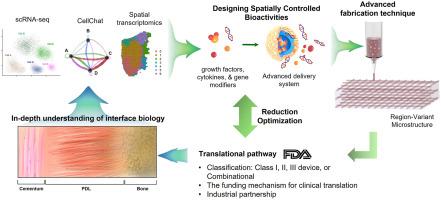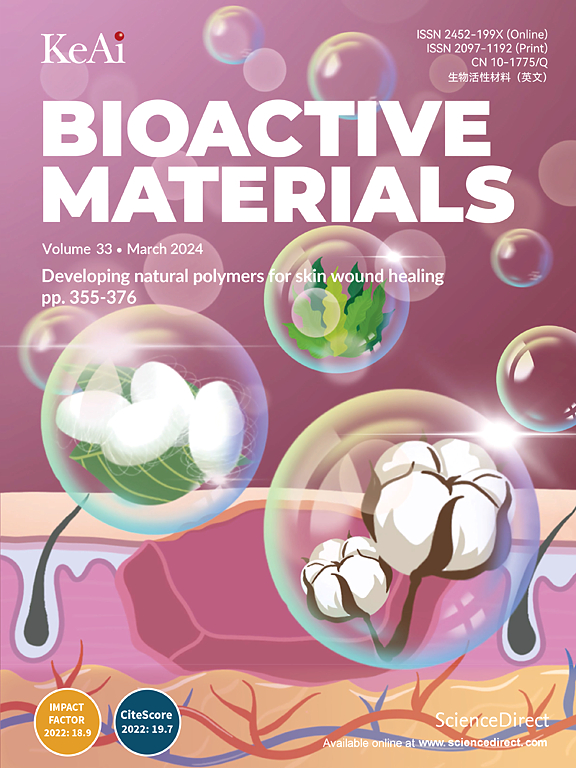通过空间控制生物活性在牙科和颅面系统中设计软硬组织界面
IF 18
1区 医学
Q1 ENGINEERING, BIOMEDICAL
引用次数: 0
摘要
软组织和硬组织之间的界面是由细胞类型和基质成分的梯度变化构成的,这些细胞类型和基质成分的最佳设计可实现适当的负荷传递和损伤保护。在肌肉骨骼系统中,肌腱-骨、韧带-骨和半月板-骨的软硬组织界面已作为再生目标被广泛研究。同样,在引导牙周多组织复合体再生方面也做了大量研究工作。然而,牙科和颅面系统中的其他软硬组织界面在一定程度上被忽视了。本综述讨论了开发牙科和颅面系统软硬组织界面再生策略的临床意义。综述还讨论了该领域的研究进展,重点是使用具有空间控制生物活性的三维支架的生物工程方法。此外,还讨论了生物活性支架在临床应用中仍面临的挑战、未来展望和注意事项。本文章由计算机程序翻译,如有差异,请以英文原文为准。

Engineering soft-hard tissue interfaces in dental and craniofacial system by spatially controlled bioactivities
The interface between soft and hard tissues is constituted by a gradient change of cell types and matrix compositions that are optimally designed for proper load transmission and injury protection. In the musculoskeletal system, the soft-hard tissue interfaces at tendon-bone, ligament-bone, and meniscus-bone have been extensively researched as regenerative targets. Similarly, extensive research efforts have been made to guide the regeneration of multi-tissue complexes in periodontium. However, the other soft-hard tissue interfaces in the dental and craniofacial system have been somewhat neglected. This review discusses the clinical significance of developing regenerative strategies for soft-hard tissue interfaces in the dental and craniofacial system. It also discusses the research progress in the field focused on bioengineering approaches using 3D scaffolds equipped with spatially controlled bioactivities. The remaining challenges, future perspectives, and considerations for the clinical translation of bioactive scaffolds are also discussed.
求助全文
通过发布文献求助,成功后即可免费获取论文全文。
去求助
来源期刊

Bioactive Materials
Biochemistry, Genetics and Molecular Biology-Biotechnology
CiteScore
28.00
自引率
6.30%
发文量
436
审稿时长
20 days
期刊介绍:
Bioactive Materials is a peer-reviewed research publication that focuses on advancements in bioactive materials. The journal accepts research papers, reviews, and rapid communications in the field of next-generation biomaterials that interact with cells, tissues, and organs in various living organisms.
The primary goal of Bioactive Materials is to promote the science and engineering of biomaterials that exhibit adaptiveness to the biological environment. These materials are specifically designed to stimulate or direct appropriate cell and tissue responses or regulate interactions with microorganisms.
The journal covers a wide range of bioactive materials, including those that are engineered or designed in terms of their physical form (e.g. particulate, fiber), topology (e.g. porosity, surface roughness), or dimensions (ranging from macro to nano-scales). Contributions are sought from the following categories of bioactive materials:
Bioactive metals and alloys
Bioactive inorganics: ceramics, glasses, and carbon-based materials
Bioactive polymers and gels
Bioactive materials derived from natural sources
Bioactive composites
These materials find applications in human and veterinary medicine, such as implants, tissue engineering scaffolds, cell/drug/gene carriers, as well as imaging and sensing devices.
 求助内容:
求助内容: 应助结果提醒方式:
应助结果提醒方式:


